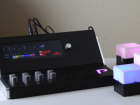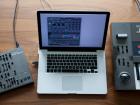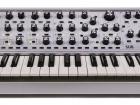Things To Consider When Buying A Used Vintage Synth

Post date:
The internet has been a boon to collectors in search of rare or unique vintage synthesizers and there are many stories of people discovering incredible bargains online. However, buying used gear online can be risky unless proper caution is exercised. There is a multitude of options when it comes to tracking down that synth you've been coveting, but finding what you are looking for is just the start. Situations, such as social distancing due to COVID-19 have also made it much harder to personally go out and purchase second-hand goods. Here are some of the things to consider when buying a used vintage synthesizer.
Trust Your Instincts
If a deal appears to be too good to be true it often is. While it can be easy to get caught up in a good deal it is important to trust your instincts. While it's not impossible for sellers to know nothing about the gear that they are selling or claim to be selling on behalf of a friend it is best to exercise caution in these types of situations. The same goes for any synths that are being sold at suspiciously low prices. A seller using stock photos or not knowing anything about the synth that they are selling are both red flags. Don't be afraid to ask questions, ask for photos and do your due diligence before committing to anything. It's not impossible to find the deal of a lifetime when it comes to synths, but be wary of scammers.
Make Sure You Know What You Are Getting
Getting your hands on a vintage synth can be exciting, but make sure that you know exactly what you are getting yourself into. Important questions to ask yourself include - Do I have enough space for this synth? Will I be able to afford the cost of replacement parts or repairs of the synth breaks? Is this synth really going to fit into my workflow? Some vintage synthesizers have a reputation for being costly to maintain or are ticking time bombs in terms of components that eventually fail. It is also worth research common problems of the synths you are interested in so you can ask the seller for proof their gear is not suffering from these issues. Some synths are easy to repair on your own with just a little knowledge, while others require hard-to-get parts or a lot of technical skills, so make sure you know the difference. The last thing you want is spending hours troubleshooting issues or having to deal with costly repairs.
Stick To Reputable Sites
There's plenty of bargains to be found on places like Facebook Marketplace, but using a service like eBay that has a return policy is often a safer bet. Sites, where you can check the reputation of the seller and look at feedback from other buyers, can also help you to avoid making costly mistakes. Good ratings are not a guarantee that the seller won't try and scam you, but it's a good place to start. Make sure that you are able to communicate with the seller and ask all the relevant questions before making any commitments. Don't buy anything that is sold as-is unless you are willing to assume full responsibility for any repair costs involved.
Be Wary About Not Buying Local
With the internet, it's easy to find bargains all over the country or even around the world, but don't forget that some synthesizers are harder to ship than others. Shipping something like the Sequential Prophet-T8 is obviously going to be a lot more challenging than say an Access Virus. If buying local is really not an option try to ensure that the seller properly packages the synthesizer before sending it to you. Vintage synthesizers that are not properly insulated with padding will have a rough time in transit. If at all possible you should also inspect the synthesizer upon arrival before the delivery person leaves. This way you can refuse delivery or claim damages if it arrives in poor condition.
Conclusion
Buying a used vintage synthesizer can be a gamble, which is why it is so important to minimize the risk of getting scammed. Let us know in the comments below or on the forum what your experiences have been like purchasing a used synthesizer. What are your tips for not getting ripped off and what have been your best or worst used synthesizer purchases?






